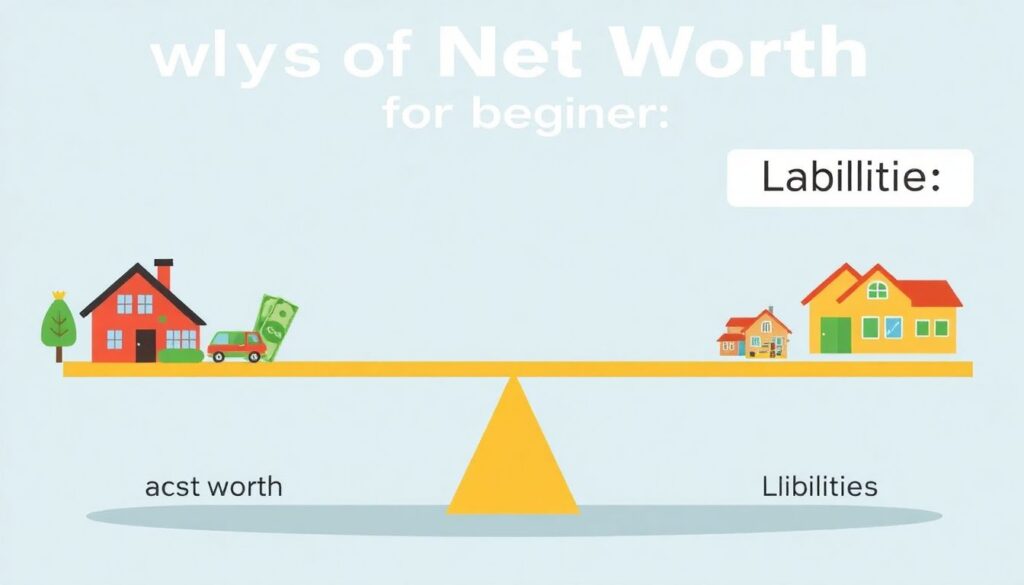Why Tracking Your Net Worth Matters

Understanding your financial position starts with a single number: your net worth. For beginners, this may sound intimidating, but in reality, it’s a straightforward concept. Simply put, your net worth is the value of everything you own minus everything you owe. Regular net worth tracking gives you a snapshot of your financial health, highlights your progress over time, and helps guide smarter money decisions. Without this baseline, it’s difficult to know whether you’re moving forward or backward financially.
Net Worth Calculation for Beginners
To calculate your net worth, you don’t need a finance degree—just a clear list of your assets and liabilities. Assets include cash, savings accounts, retirement accounts, investments, real estate, and even personal valuables like a car or jewelry. Liabilities, on the other hand, are the debts you owe: mortgages, student loans, credit card balances, and any other outstanding obligations. Subtracting your total liabilities from your total assets gives you your current net worth.
Example:
Let’s say you have $12,000 in savings, $18,000 in a retirement account, and a car worth $10,000. That’s $40,000 in assets. You also have $5,000 in credit card debt and $15,000 left on a car loan—$20,000 in liabilities. Your net worth is $40,000 – $20,000 = $20,000.
How to Track Net Worth: Manual vs. Automated Methods
There are two main ways to track your net worth: manually (e.g., spreadsheets) or using specialized tools. Each approach has its pros and cons, especially if you’re just starting with personal finance net worth tracking.
Manual Tracking

Creating your own spreadsheet in Excel or Google Sheets is a simple and flexible way to start. You list your assets and debts, update them monthly, and calculate the difference. This method gives you full control over categories and frequency.
Pros:
1. Total customization
2. No subscriptions or privacy concerns
3. Great for understanding every detail
Cons:
1. Time-consuming
2. Prone to human error
3. No automation for account updates
Automated Tools and Apps
Modern net worth tracking tools like Mint, YNAB (You Need A Budget), or Personal Capital automatically sync with your financial accounts, updating balances and calculating your net worth in real time. These are widely considered among the best net worth tracker apps for beginners and seasoned users alike.
Pros:
1. Real-time updates
2. Visual dashboards and trend analytics
3. Easy to set goals and alerts
Cons:
1. Limited customization
2. Data privacy concerns
3. Some features may require paid access
Comparing Real-Life Approaches
Consider Anna, a 28-year-old graphic designer. She started tracking her finances manually in Google Sheets but often forgot to update her balances. After six months, she switched to an app, which not only automated her updates but also gave her insights into spending patterns she hadn’t noticed before.
Meanwhile, David, a 35-year-old IT specialist, prefers spreadsheets. He enjoys crafting detailed scenarios for future goals, like buying a home or early retirement. For him, the manual process is part of his review ritual and helps him stay engaged.
Choosing the Right Net Worth Tracking Tools
When selecting the best net worth tracker apps or tools, consider your comfort level with technology, how often you want to update your data, and how secure you feel connecting your bank accounts. Some tools, like Tiller Money, combine the flexibility of spreadsheets with automation by importing data directly into Google Sheets. Others, like Empower (formerly Personal Capital), are full-suite platforms with investment analysis and retirement planning.
Factors to Consider:
1. Does the tool sync with your accounts automatically?
2. Can you set custom categories?
3. Are there fees or premium versions?
4. How secure is your financial data?
Building a Routine: Making Tracking a Habit

The key to effective net worth tracking isn’t just choosing the right tool—it’s consistency. Start by reviewing your net worth monthly. Set a calendar reminder or pair it with another habit, like paying bills. With time, you’ll begin to notice patterns: maybe your investments are growing, but your credit card balance is creeping up. These insights are invaluable for adjusting your personal finance strategy.
Final Thoughts: Start Simple, Stay Consistent
Net worth tracking for beginners doesn’t require perfection or complex tools—it requires awareness and intention. Whether you prefer spreadsheets or the best net worth tracker apps, the essential step is to begin. Over time, you’ll gain clarity, confidence, and control over your financial journey. Like any habit, the more you practice, the more rewarding it becomes.
